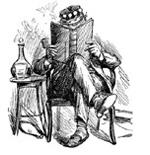
Saving Pop
FROM THE BLUE RIDGE MOUNTAINS TO THE BOSOM OF ABRAHAM
When we Christians are young and excited about our faith and the Gospel, we are confident that the trajectory of our lives will be one of growth in sanctification and deepening in a love that, to quote St. Paul, “may abound more and more, with knowledge and all discernment” (Phil. 1:9). We will grow old, we think, ever more united to God and His will, bearing the badges of a life well lived, having fought the good fight, finished the race, and kept the faith. Yet — and I say this as a former Presbyterian seminarian who was sure of his election — even the most strident Calvinist is bound at some point to question whether that guarantee of faithfulness applies to him personally. No less than Calvin himself argued that some individuals who believe themselves “chosen” will discover upon death that they are actually among the damned — a terrifying thought! What confidence can we have that He “who began a good work” in us will indeed “bring it to completion” (Phil. 1:6)?
Such thoughts were on my mind on the five-year anniversary of the death of my Brooklyn-born, Irish-American, tenaciously Catholic grandfather, who passed away at the age of 90. He was a man whose life and experiences were intertwined with many of the most important cultural and historical events of the 20th century: He grew up in inner-city New York during the Great Depression, his family so poor that he had to drop out of high school and take a job as a delivery man; he enlisted in the Coast Guard at the beginning of World War II; he started his own fledgling dental-supply business amid the great American aspirations that followed the war’s conclusion; he led a family of seven through the sea change of the Second Vatican Council; and he sold his surprisingly successful business during the Reagan-era capitalist boom, acquiring enough money to build his own isolated mountain home and enjoy a comfortable retirement.
As the anniversary of his death approached, members of my extended family gathered at that remote refuge in Virginia’s Blue Ridge Mountains to celebrate Easter. Another exciting development was on our minds: Someone had finally agreed to buy the property. The family would say goodbye, not only to a home that had hosted so many festive gatherings, but also, in a sense, to my grandfather. The house still emitted, in sight, smell, and touch, the presence of our “Pop.” Where was he now, we wondered, this man who was to us larger than life and full of contradictions, who elicited so much admiration and angst?
I myself felt this tension acutely, having devoted so many prayers to God on behalf of my grandfather, and having engaged in so many conversations with him. As a youthful and fervent non-denominational evangelical, later as an intellectually curious and doctrinally stringent Calvinist, and, finally, as a humbled revert to the Catholicism of my birth, my mission for almost 20 years remained the same: that my grandfather should know and love the Lord Jesus Christ. My yearning — so potent I still feel it — emanated from that most fundamental of Christian doctrines, the purest and most ecumenical of Christian desires: that my grandfather might “know him, and the power of his resurrection” (Phil. 3:10), that he might experience what Pope Benedict XVI called the “personal encounter” with Jesus Christ. This is the story of that spiritual pilgrimage: walking beside my grandfather, pressing on toward that eternal prize, hoping that the “perseverance of the saints” applied to him.
You May Also Enjoy
A remarkable family and their little spiritual oasis in the Gateway to the West have become, as divine fate would have it, a gateway to Catholicism.
The early Jesuits and their lay helpers required not just strong stomachs and great courage but even more: great love.
These pilgrims hear the authority of Christ speaking through the apostolic and Petrine ministry.

